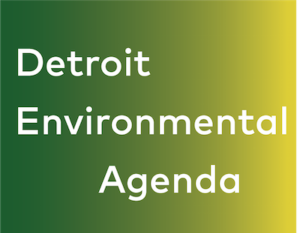M.L. Elrick

Q: Where can people go to learn more about your biography? If not readily available online, please describe in 150 words or less, your relevant experience, public offices held (if any), involvement in environmental causes, and membership in any environmental organizations. If you currently hold office, describe any votes or actions demonstrating concern for the environment.
A: I have been a newspaper and television reporter for the past 30 years, so I was limited to joining only professional organizations and apolitical entities like my children’s school board (I was a school commissioner at St. Clare of Montefalco Catholic School), my neighborhood association (I am the East Outer Drive street rep and a member of the East English Village Neighborhood Association board here in Detroit, and the Clark Park Winter Carnival Committee (I created an outdoor charity hockey game at Clark Park that has raised more than $125,000 for Detroit children since 2015). The only offices I have held have been in unions to which I belonged. I was an activist, organizer, steward, negotiator and vice chairman of the Detroit Free Press unit of the Newspaper Guild of Detroit.
Community
Q: If elected, how will you work with Detroit residents to ensure that they benefit from and partake in the decision-making surrounding local development projects and that potential adverse impacts of those projects are identified, measured, monitored and mitigated? Moreover, how would you work to put more power into the hands of residents to maintain and revitalize their own communities and to access vacant land through the DLBA?
A: I plan to be the most responsive councilman the city has ever seen! This is in part because I believe in listening to the concerns of others and also because, as a reporter, I am trained to listen to and respond to the concerns of others. My office will be a vigorous and relentless advocate for constituents in their dealings with the DLBA. Persuasion and persistence are powerful forces, when properly applied.
Q: If elected, what budget appropriations would you propose to increase investment in needed social and environmental services to help improve the quality of life and health of Detroit residents?
A: I would increase the amount of funding to create natural ways to retain and treat water runoff before it enters the stormwater treatment system, provide funding to support a non-profit that would help needy families keep their water from being shut-off, increase funding for therapeutic services to help the homeless and needy get access to mental health services and build solar fields in vacant lots to generate energy that can be sold back to DTE and the credits used to offset bills generated by Detroiters who cannot afford to pay their gas and electric charges.
Public Health
Q: What long term solutions do you see for addressing vehicle speeds and making our streets safer?
A: The installation of speed humps on blocks that request them are a short-term solution. I hope to increase the number of traffic enforcement officers in neighborhoods.
Q: How will you work to reduce the negative health impacts of air quality on the residents of Detroit?
A: By working with local, county and state regulatory agencies to stay current on air quality data and to scrutinize all development proposals for their potential impact on the environment. I will also support and facilitate mitigation projects, such as creating green spaces and converting abandoned lots into urban gardens and farms.
Q: If elected, what actions will you take to work toward safer, healthier, and more affordable housing for all Detroiters?
A: I will work with neighborhood associations, block clubs, non-profits, churches, CDCs, and the city’s building department to make sure that housing meets safety codes and that unscrupulous landlords are identified and held accountable for providing housing that is fit for habitation. I will also consider whether projects seeking city approval include affordable housing units in their overall plan before deciding whether to support them. And I will work with the city’s housing department and Detroit Land Bank Authority to help find ways to reduce the backlog of families seeking affordable housing.
Energy
Q: What are your priorities to reduce emissions and lessen the impacts of climate change in Detroit during your term in office?
A: I will work to replace the city’s fleet of vehicles with hybrids and full-electric vehicles, increase funding to create natural ways to retain and treat water runoff before it enters the stormwater treatment system and build solar fields in vacant lots to generate energy that can be sold back to DTE.
Q: What are your plans for helping the city transition to renewable energy and how will you ensure that the cost benefits and increased resilience that come from the use of renewables is made accessible to low-income and vulnerable communities across Detroit?
A: I converted my home to solar power a couple years ago and will work through the city’s land process to increase the city’s use of solar power by looking for opportunities to convert vacant land into solar fields and wind farms. I will work through the budget process to transition our vehicle fleet to hybrid and electric vehicles. I will work with neighborhood associations, non-profits, foundations, churches and CDCs to build solar fields that will provide energy to nearby residents. Some of this is already happening in the Jefferson-Chalmers area, and I would like to see if that is a model that can be replicated throughout the district and, ultimately, the entire city.
Recycling
Q: How can the city increase recycling, composting, and the use of post-consumer recycled materials, while addressing the city’s litter and illegal dumping problem?
A: Education and communication are key. People like recycling, but if they are confused or it is too difficult, they will not make the effort. Enforcement and encouragement are keys to fighting litter and illegal dumping. Stressing personal responsibility and a public service campaign, as well as the placement of attractive and convenient trash and recycling receptacles, will help reduce litter. Cameras placed in dumping “hot spots” will help catch the offenders. I propose publicizing the names of dumpers to help discourage others who would turn out city into a landfill.
Jobs
Q: What steps would you take to prepare the local workforce to take advantage of and be part of the movement toward a green economy, through qualifying for good paying infrastructure and clean energy jobs, amongst others?
A: I would like to see the public school system create a high school or academy focused on preparing students for jobs in the green economy. I will also work with unions to ensure that their apprenticeship programs are geared to take advantage of job opportunities in the green economy.
Water
Q: How will you ensure that clean water is accessible and affordable to all Detroiters?
A: I will work with the water department, foundations, non-profits, corporations, churches and appeals to citizens to create a non-profit similar to THAW (The Heat and Warmth fund) that provides assistance to needy residents who cannot afford their water bills.
Q: How will you help municipal agencies and property owners integrate Green Stormwater Infrastructure (GSI) across the city to manage stormwater and reduce drainage charge fees for property owners?
A: I want to help keep fresh water out of the city’s system by encouraging and providing incentives for residents to install rain barrels (as I have) and for large customers to install rain gardens, bioswales and other alternatives to allowing millions of gallons of water from entering our costly and chemical and energy intensive treatment system. As an elected official, I would call for an informational campaign to make people aware of these options as well as provide financial assistance and incentives to encourage customers to take advantage of these earth and money saving opportunities. I would work with neighborhood groups and residents to create gardens on vacant properties. Last, but not least, I will lead by example. I already have a car charger, solar panels and rain barrels at my home.
Optional
Q: Please identify the top environmental concerns to you personally, identify the environmental issue in your community that is the most pressing, and what you would like to do as an elected official to address this most pressing concern.
A: Reducing the use of carbon-emitting technology is my top environmental concern. I converted my home to solar power, I have a car charger and a hybrid vehicle, we use a tankless water heater and rain barrels. Providing grants, credits and other incentives for rain barrels, rain gardens, bioswales, community gardens/farms and solar arrays are top priorities. Government can create policies and regulations that encourage and even mandate sound policy, but I think we can also educate, encourage and incentivize constituents to meet and exceed those targets on their own. Besides recycling and replacing inefficient machines, government can insist that new projects meet LEED certifications and convert vehicle fleets to hybrid and electric power plants.

